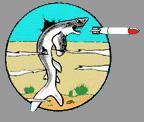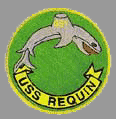| June
17, 1943 |
REQUIN
ordered as one of 80 Tench-class hulls. |
| August
24, 1944 |
Keel
laid at Portsmouth NSY. |
| January
1, 1945 |
REQUIN
is launched. |
| April
28, 1945 |
REQUIN
is commissioned at 11:30 AM, with Slade Cutter as the first CO. |
| June
1945 |
REQUIN
departs New London, CT for Pearl Harbor and the Pacific theater.
|
| August
15, 1945 |
REQUIN
is in Pearl Harbor, preparing for her first war patrol when the
war ends. |
| August
26, 1945 |
REQUIN
departs for the United States, with orders to report to the Atlantic
Fleet. She arrives at the Naval Frontier Base, Staten Island (New
York) on September 17, 1945. |
| January
6, 1946 |
Requin
departs New York for Key West Naval Station, Florida, becoming a
unit of Submarine Squadron 4. |
| August
- November 1946 |
REQUIN
is in Portsmouth Naval Shipyard, undergoing modification to an early
radar picket configuration. |
| November
13, 1947 |
REQUIN
crosses the Arctic Circle, participating in exercises with her sister
radar
picket submarine SPINAX (SS-489). |
| January
20, 1948 |
REQUIN
reclassified as SSR-481. Begins modification to the MIGRAINE II
Radar Picket configuration at Portsmouth NSY, NH. |
| December
1948 |
REQUIN
departs Portsmouth NSY after competing trials with new radar equipment
and reports to New London, Connecticut for duty with Submarine Squadron
8. |
| June
15, 1949 |
REQUIN
is transferred to Norfolk Navy Base and reports to Submarine Squadron
6. |
| January
9, 1951 |
REQUIN
departs for the Mediterranean for her first deployment with the
US Sixth Fleet. |
| April
25, 1956 |
REQUIN
earns an "Outstanding" during an Operational Readiness
Inspection, the first radar picket submarine to receive this award.
|
| June
to August 1959 |
REQUIN
reports to the Navy Yard in Charleston, South Carolina for removal
of all radar equipment and conversion to Fleet Snorkel configuration.
|
| August
15, 1959 |
REQUIN
reclassified as SS-481. |
|
|
| After
conversion to Fleet Snorkel, REQUIN rejoins SubRon 6 in Norfolk
and begins operations as a normal attack submarine. She would remain
in this role until her decommissioning in December of 1968. |
|
|
|
| September
20, 1963 |
REQUIN
completes her 5,000th dive. |
| September
14, 1966 |
REQUIN
departs for UNITAS VII exercises with various South American navies,
along with circumnavigation of the South American continent. |
| April
4, 1967 |
REQUIN
departs Norfolk for her final deployment with the Sixth Fleet in
the Mediterranean. |
| May
28, 1968 |
In
her last deployment before decommissioning, REQUIN departs Norfolk
as part of the major search effort for the missing nuclear attack
submarine USS SCORPION (SSN-589). |
| June
29, 1968 |
REQUIN
is reclassified as AGSS-481 (Miscellaneous Auxiliary Submarine).
|
| December
3, 1968 |
REQUIN is decommissioned after 23 years of service. |
| February
1969 |
REQUIN
is towed to St. Petersburg, Florida to serve as a Naval Reserve
Training Ship. |
| June
30, 1971 |
REQUIN is reclassified as IXSS-481 (Unclassified Obsolete Submarine).
|
| December
20, 1971 |
REQUIN
is stricken from the Navy List. |
| June
17, 1972 |
REQUIN
is transferred to Tampa, Florida as a tourist attraction. (She would
be operated in this role until 1986, when she was closed down, due
to the lack of funding and support.) |
| February
21, 1990 |
Senate
Bill S.2151 is introduced in the US Senate by the late Sen. John
Heinz
(R-Pa) which would allow REQUIN to be transferred as an exhibit
for the new Carnegie Science Center in Pittsburgh, Pennsylvania.
|
| May
24, 1990 |
REQUIN
is towed to Tampa Shipyard for dry docking and hull repairs, in
preparation
for her move to Pittsburgh. |
| August
7, 1990 |
REQUIN
leaves International Ship Repair in Tampa under tow to Baton Rouge,
Louisiana, where she will be placed onto barges for tow up the Mississippi
River, up the Ohio River to Pittsburgh. |
| August
11, 1990 |
REQUIN
begins to be towed up the Mississippi. |
| September
4, 1990 |
REQUIN
arrives in Pittsburgh at her berth on the Ohio River, in front of
the new Carnegie Science Center. |
|
October
20, 1990
|
REQUIN
is dedicated as a memorial and first museum exhibit at
the Carnegie Science Center. Open for tours. |





